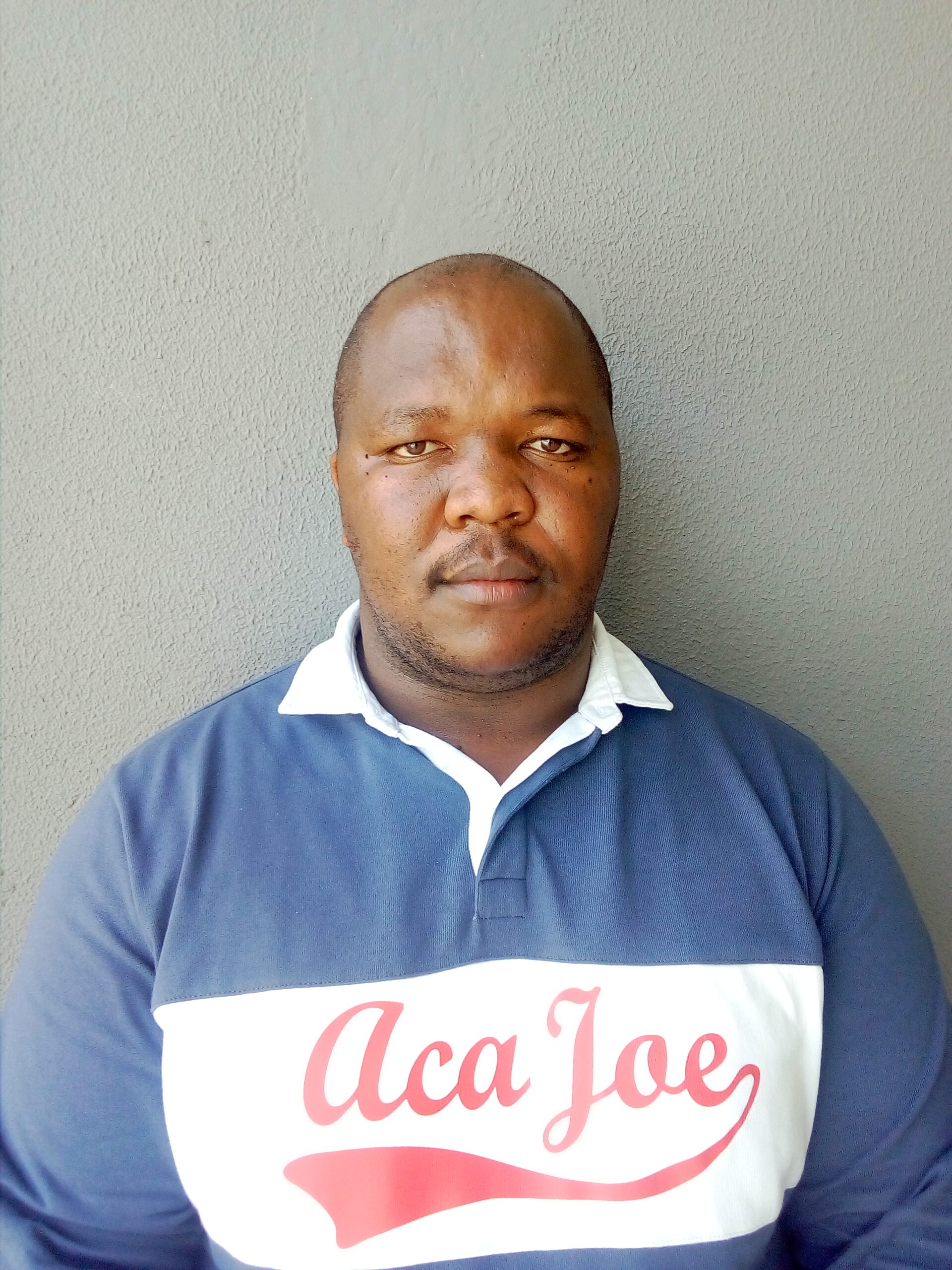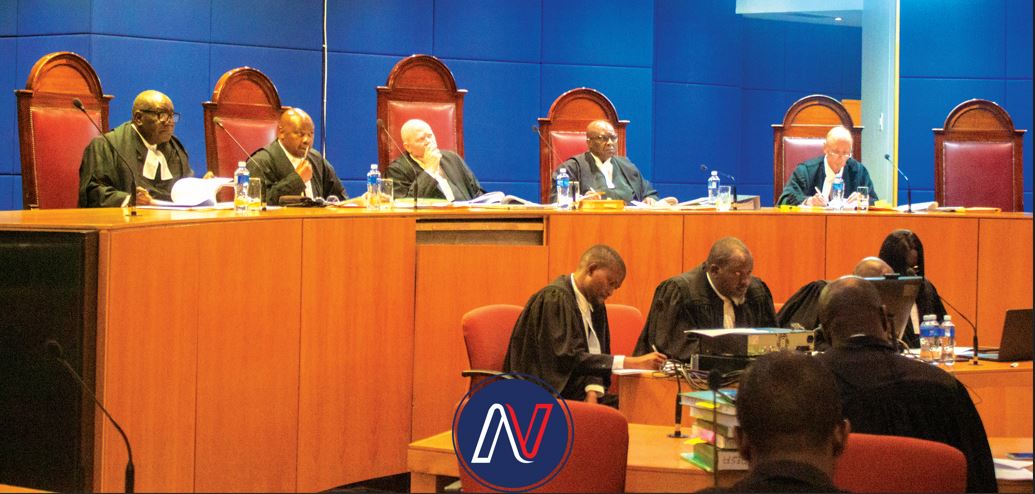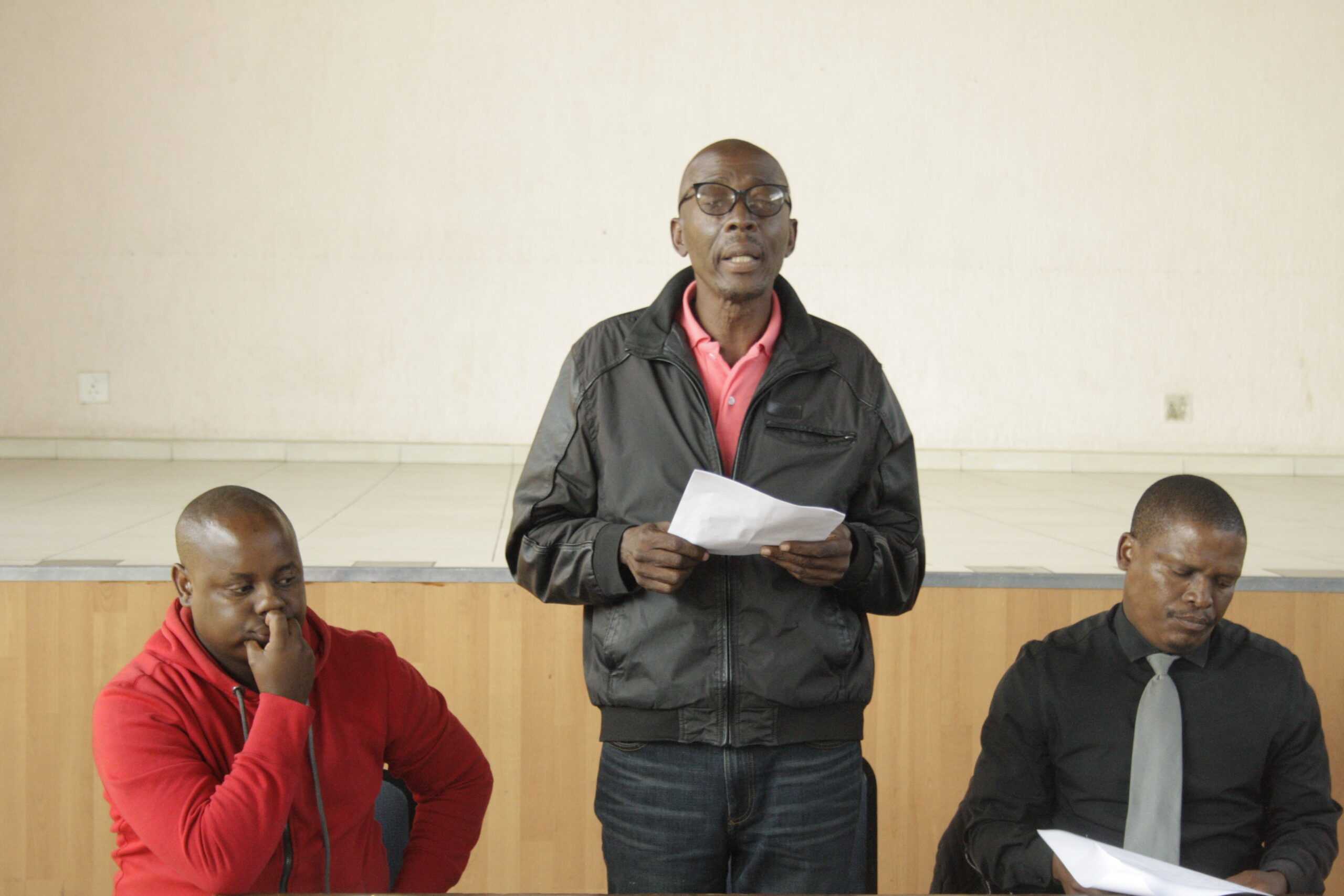The Court of Appeal this week heard the unusual bail hearing of former Commissioner of Police (COMPOL) Molahlehi Letsoepa, who faces charges linked to the murder of Police Constable Mokalekale Khetheng. The deceased’s family is calling for Letsoepa’s immediate arrest.
A full bench of five judges, Court President Professor Kananelo Mosito, Chief Justice Sakoane Sakoane, Judge Petrus Damaseb, Judge Philip Musonda, and Judge Van der Westhuizen, presided over the matter, which has drawn national attention.
Letsoepa, who fled Lesotho in 2017 following Khetheng’s murder, recently returned after seven years abroad. Upon his return, he reportedly met with Minister of Justice and Law Richard Ramoeletsi, Commissioner of Police Borotho Matsoso, and the investigating officer, meetings that the Court sharply questioned.
“What does the Minister of Justice have to do with someone who is facing criminal charges?” questioned Judge Petrus Damaseb.
The bench expressed serious concern over the Minister’s involvement, questioning why an ordinary murder suspect would be afforded such privileged access to top government officials.
The Court also criticised the manner in which the High Court initially handled the matter, in chambers, citing that bail proceedings, particularly in criminal cases, must be held in open court to ensure transparency and public confidence.
This unprecedented situation has raised fundamental questions about judicial integrity, political interference, and the equality of all citizens before the law.
The Khetheng murder trial continues in the High Court. The accused — Thabo Tšukulu, Mabitle Matona, Haleokoe Taasoane, and Mothibeli Mofolo, are facing charges under section 4 of the Penal Code No. 6 of 2010. Former Police Minister Tšeliso Mokhosi, initially among the accused, was later released on bail and turned state witness.
Police Constable Mokalekale Khetheng was last seen alive on March 26, 2016, at Ha-Mokhalinyane on the outskirts of Maseru. His body was later exhumed at Lepereng, months after he was reported missing in what investigators described as a gruesome killing.
In their court application, Khetheng’s family, who are appellants, complained of what they described as the “honourable” treatment accorded to Letsoepa, who they argue was admitted to bail under “questionable circumstances.” “Therefore, it appears that the bail application was heard in chambers under circumstances which require considerable explanation,” they stated.
“This Honourable Court has deprecated the habit of handling controversial cases in chambers in a number of instances. I [Thabo Khetheng] understand the approach of this Honourable Court to be that public hearings are open to media coverage so that proceedings are not shrouded in secrecy. In any event, I am satisfied with the decision of the Court a quo [High Court] in terms of which Mr. Molahlehi Letsoepa was granted bail in chambers.
“Transparency connotes openness, frankness, honesty, absence of bias, collusion, and consideration of any sort,” reads Khetheng’s father’s affidavit.
Khetheng’s family lawyer, Advocate Christopher Lephuthing, argued that, given the viva voce evidence, evidence by word of mouth, presented during the habeas corpus application filed by the deceased’s family following his disappearance, questions remain over the Director of Public Prosecutions’ (DPP’s) stance in not initiating extradition proceedings.
“For reasons known to the office of the Director of Public Prosecutions, no effort was made to secure the appearance of Mr. Letsoepa, who had evaded justice by hiding in the Republic of South Africa, but the DPP opted to apply for separation of trials,” the affidavit reads.
Advocate Lephuthing submitted that individuals who “acquired specialized knowledge of the system and became skilled and sure-footed in defeating the ends of justice continue to exploit means of releasing proven flight risks on bail,” adding that this practice is at odds with the law and public expectations of the administration of justice and a criminal justice system based on constitutionalism.
The deceased’s father further accused Letsoepa in his affidavit of “undermining and jeopardising” the objectives and proper functioning of the criminal justice system while serving as COMPOL. He said this was evident when Letsoepa opposed the habeas corpus application following the deceased’s disappearance. He further pointed out that Letsoepa was supported by the Crown to the extent that taxpayer money was used to furnish the court with “false information,” regardless of the circumstances in which the deceased was killed and the public outrage those events induced.
The family also criticised Judge ‘Mafelile Ralebese for granting Letsoepa’s bail without providing reasons. “More particularly, the basic enquiry remains to ascertain where the interests of justice lie in a situation where the ringleader is admitted to bail while his operatives are refused bail.”
They also accused the Crown of filing the affidavit of Inspector Tankiso Lethoko, which “they did not commission by design,” pointing out that this move was intended to give Letsoepa an “unmerited advantage,” resulting in a default judgment in his favour.
“I am considering section 12 of the Criminal Procedure and Evidence Act 1981 in the circumstances of this case. The Crown’s conduct in not pursuing the extradition process suggests that they harboured or assisted him [Letsoepa] to evade justice, as they did in opposing the habeas corpus application, while proceeding with the trial for the same joint offence of killing my son,” the affidavit further reads.
The judgment is expected to be handed down on November 7.
Summary
- The Court also criticised the manner in which the High Court initially handled the matter, in chambers, citing that bail proceedings, particularly in criminal cases, must be held in open court to ensure transparency and public confidence.
- In any event, I am satisfied with the decision of the Court a quo [High Court] in terms of which Mr.
- Advocate Lephuthing submitted that individuals who “acquired specialized knowledge of the system and became skilled and sure-footed in defeating the ends of justice continue to exploit means of releasing proven flight risks on bail,” adding that this practice is at odds with the law and public expectations of the administration of justice and a criminal justice system based on constitutionalism.

Thoboloko Ntšonyane is a dedicated journalist who has contributed to various publications. He focuses on parliament, climate change, human rights, sexual and reproductive health rights (SRHR), health, business and court reports. His work inspires change, triggers dialogue and also promote transparency in a society.










